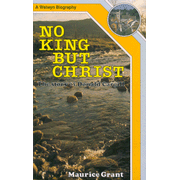The best way to describe Donald Cargill’s life is “Richard Cameron minus the muskets.” He stood for the same principles as Cameron but ultimately did not actively confront the government. Cargill’s life is not that different from other Covenanter field preachers, but he is set apart in that he excommunicated the king and thought out a coherent (if too cautious) theory of resistance.

Like Cameron and other field preachers, Cargill rejected compromises like the Indulgence (an interesting study would be to compare the Indulgences of the post-1660 Indulgences to today’s 501(c)(3) exemptions; warning: you will lose your job as an academician if you do so). They saw this as a concession of Christ’s royal prerogatives, not only to the state, but to a debauched and degenerate monarch. Who ruled the Church? Jesus or the State? It is important to point out that both sides saw their claims as absolute (shades of Rushdoony!). If the Erastian position is true, then any resistance to his ecclesiastical claims is in fact a resistance to his civil claims. A conservative theorist can no longer simply say, “We will resist you in the ecclesiastical realm by spiritual weapons, but we won’t resist in the civil realm.” The Erastian (quite consistently) sees no such distinction.
Resistance
If such was the opposition between church and state, then it is hard to avoid the outcome. This is where I think Cargill was inconsistent. He saw the issues as clearly as Cameron did (or even more clearly), but he refused to follow the applications like Cameron did. At his trial, his Erastian accusers asserted that Cargill’s Melvillian 2-Kingdom view led to civil disobedience (and granting their premises, they were correct): since the Crown was metaphysically one (cf. Kantorowicz, The King’s Two Bodies), any rejection of one aspect of its sovereignty, as Head of the Church, is in fact a rejection of the Crown entire. As Grant notes, it is civil, not ecclesiastical disobedience.
Second issue: Charles II had sworn to abide by the sanctions of the Solemn League & Covenant–he based his legitimacy on them (which covenants, the Word of God calls binding, Galatians 3:15). He broke the covenants; therefore, he forfeited his legitimacy over Presbyterian Scotland. It was on these grounds that Cameron took up arms (and on other legitimate grounds; lawful self-defense and defense of the helpless, which natural law says we can do [it’s so fun to appeal to natural law when it comes to resistance; critics of theonomy don’t know what to do with that! LOL]). And since Charles’ troops were raping and murdering their way across Presbyterian Scotland, Cameron’s struggle was a limited, defensive war which had already been justified by Samuel Rutherford.
Cargill refused to follow Cameron on these principles, but I think Cameron was right. Given the Crown’s metaphysical assumptions, it made no sense to plead for a partial resistance. Given that the oaths that Charles II swore to implicitly called for his removal if he broke them, resistance was justified since the law implied that.
Notwithstanding, Cargill died well. The book is well-written and the endnotes provide a gold mine of interesting information. Interestingly, in this book Grant is quite critical of Cameron’s actions, but in Grant’s biography of Cameron written over a decade later, he tries to justify Cameron’s actions.
No comments:
Post a Comment